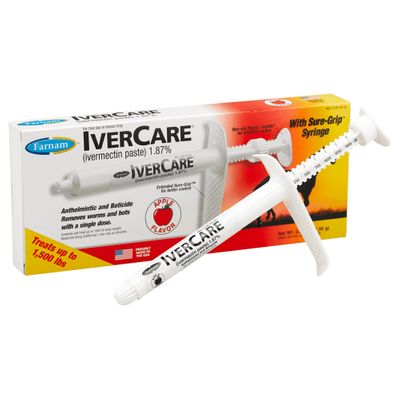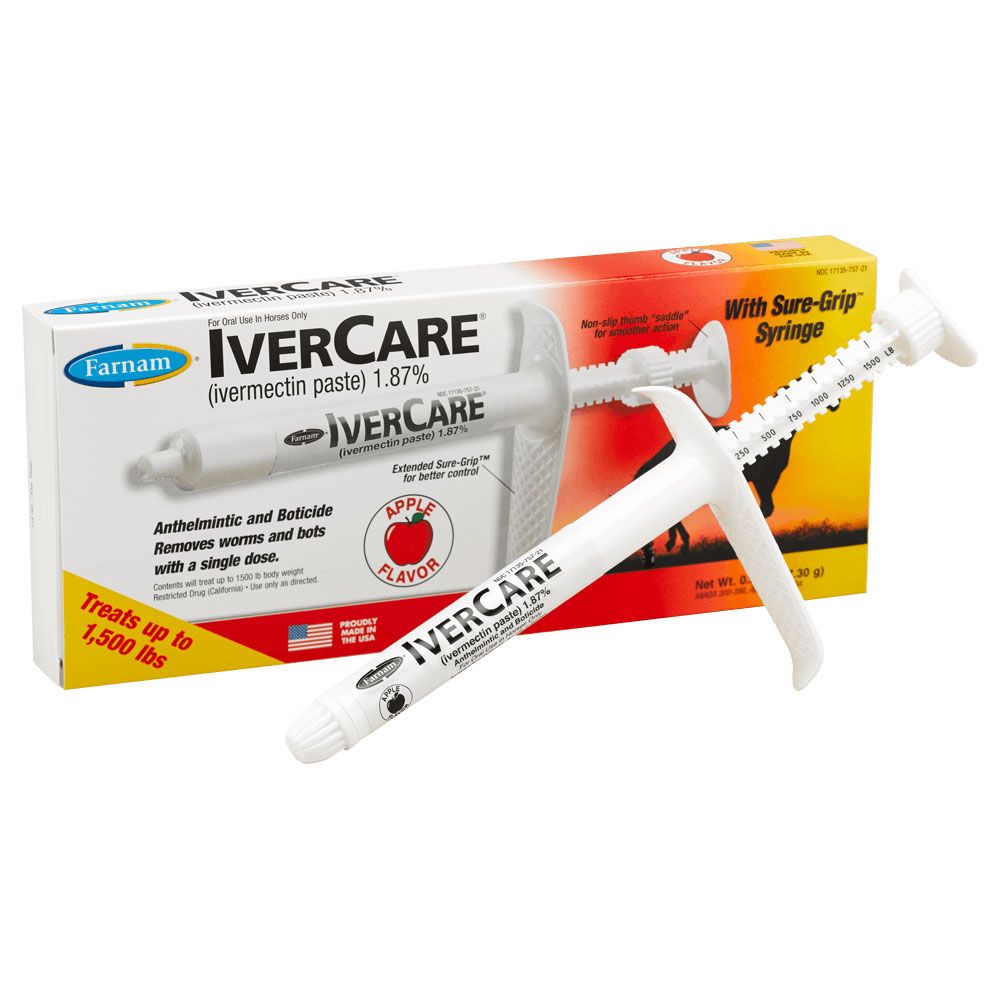Farnam IverCare Paste, Anthelmintic and Boticide, 7.3gm
Notice
Ivermectin is excluded from shipping to the United Kingdom
Description
Remove worms and bots with a single dose of IverCare® (ivermectin paste) 1.87%. This convenient paste offers broad-spectrum parasite control and comes in the extended Sure-Gripô syringe. Proudly made in the U.S.A., it's the only ivermectin product that treats horses up to 1,500 pounds in a single dose.
- Broad-spectrum parasite control
- The only ivermectin that treats horses up to 1,500 lbs in one dose
- Available in the easy-to-use Sure-Gripô syringe
- Proudly made in the U.S.A.
- Red Apple Flavored
Useful Information
This syringe contains sufficient paste to treat one 1,500 lb horse at the recommended dose rate of 91 mcg ivermectin per lb (200 mcg/kg) body weight. Each weight marking on the syringe plunger delivers enough paste to treat 250 lb body weight.
1. While holding plunger, turn the knurled ring on the plunger 1/4 turn to the left and slide it so the side nearest the barrel is at the prescribed weight marking.
2. Lock the ring in place by making a 1/4 turn to the right.
3. Make sure that the horse's mouth contains no feed.
4. Remove the cover from the tip of the syringe.
5. Insert the syringe tip into the horse's mouth at the space between the teeth.
6. Depress the plunger as far as it will go, depositing paste on the back of the tongue.
7. Immediately raise the horse's head for a few seconds after dosing.
PARASITE CONTROL PROGRAM:
All horses should be included in a regular parasite control program with particular attention being paid to mares, foals and yearlings. Foals should be treated initially at 6 to 8 weeks of age, and routine treatment repeated as appropriate. Consult your veterinarian for a control program to meet your specific needs. IverCare® (ivermectin) Paste 1.87% effectively controls gastrointestinal nematodes and bots of horses. Regular treatment will reduce the chances of verminous arteritis caused by Strongylus vulgaris.
WARNING:
Do not use in horses intended for human consumption.
Not for use in humans. Keep this and all drugs out of reach of children.
PRECAUTIONS:
IverCare® (ivermectin) Paste 1.87% has been formulated specifically for use in horses only. This product should not be used in other animal species as severe adverse reactions, including fatalities in dogs, may result.
INFORMATION FOR HORSE OWNERS:
Swelling and itching reactions after treatment with Ivermectin Paste have occurred in horses carrying heavy infections of neck threadworm microfilariae (Onchocerca sp.). These reactions were most likely the result of microfilariae dying in large numbers. Symptomatic treatment may be advisable. Consult your veterinarian should any such reactions occur. Healing of summer sores involving extensive tissue changes may require other appropriate therapy in conjunction with treatment with Ivermectin Paste. Reinfection, and measures for its prevention, should also be considered. Consult your veterinarian if the condition does not improve. Store at 20°C to 25°C (68°F to 77°F), excursions permitted between 15°C and 30°C (between 59°F and 86°F).


